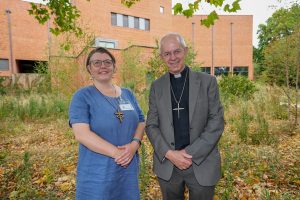Convened by the Archbishop of Canterbury, the Lambeth Conference is an opportunity for Anglican Bishops from around the world to meet, pray and talk together.
The conference – held this year from 26 July to 8 August – is held every ten years to discuss church and world affairs and the global mission of the Anglican Communion for the decade ahead.
Themed ‘God’s Church for God’s World – walking, listening and witnessing together,’ the aim this year is to explore what it means for the Anglican Communion to be responsive to the needs of a 21st century world.
 (Image:Justin Welby, the Archbishop of Canterbury and the Revd Fiona Bennett at the Lambeth Conference. Photo: Andrew Baker for The Lambeth Conference)
(Image:Justin Welby, the Archbishop of Canterbury and the Revd Fiona Bennett at the Lambeth Conference. Photo: Andrew Baker for The Lambeth Conference)
The Revd Fiona Bennett, Moderator of the United Reformed Church General Assembly, was invited to the conference and shares the following thoughts:
The Archbishop Welby greeted me warmly on behalf of the URC and was delighted to share that at the last Lambeth Conference of Anglican Bishops 18 were women, this time there were 96.
Around ten broad topics were explored at the conference which included “Calls” ie invitations to action for the whole church.
On 3 August, writer and comedian Sandy Toksvig’s wrote an open letter to Archbishop Justin Welby on Twitter about the Conference’s discussion on one of the ten topics ‘Human Dignity’, which included sexuality.
Sandy asked: “Seriously, with the state the world is in, that is what you wanted to focus on?”
I am led to believe that it was Archbishop Welby’s hope that the threefold environmental crisis of climate change, biodiversity decline and pollution would be the headlines, but the call on human sexuality certainly got more media coverage.
Point 3.3 on the Call regarding human sexuality is about extending “the work of the Anglican Communion Office to Promote Human Dignity with Attention to Sexuality as well as Gender. We call upon the Anglican Consultative Council (ACC, informed by relevant networks and departments of the ACO and informed by Lambeth 1998 resolution I.10), to examine whether its work on Gender Justice should be expanded to promote provincial and inter-provincial vision and practices toward human dignity with attention not only to gender but also sexuality. The ACC should explore this possibility at the ACC-18 meeting in 2023. At ACC-19 provincial and inter-provincial reports should be received and further recommendations made”.
Whilst the Call does include that the 1998 Resolution 1.10 informed the process, the instruction to examine whether its work on Gender Justice should be expanded to promote provincial and interprovincial vision and practises is interesting because the provincial and interprovincial visions and practises vary.
Some provinces, like Scotland, affirm same gender relationships and marriage, while some don’t. To expand to promote these visions and practises would be to expand to promote diverse visions and practises, including those which fully affirm LGBTQI+ identity and marriage as well as those which don’t.
This seems to imply a change in the C of E’s approach.
Sandy Toksvig’s comment that that Lambeth Conference has upheld and not changed the 1998 Resolution1.10, is correct but it is not a true reflection to say: “It was a sin in 1998 and you just wanted to make clear in 2022 that no one in your finely frocked gang has moved on that.”
Several of the Provinces have “moved on that” and I believe the 2022 Call invited a process to recognise the diversity of perceptions and practises held and lived out in the Provinces and Inter-provinces across the world.
This is not a dramatic statement of a changed stance but shift towards inclusion of diverse views.
I was reminded that the talks to form the Church of North India in 1970, which was a union of six denominations, took 41 years.
Whilst I agree with Sandy’s view that the impact of the Anglican Communion, and other faith organisations, not making clear statements to affirm LGBTQI+ identity and relationships, is costing lives, and I personally would like to see dramatic change to include and affirm LGBTQI+ identity and relationships now, not taking 41 years.
I am hopeful that the Calls of the 2022 Conference indicate signs that, like a large ship adjusting direction, the C of E has made a shift in a slow process towards affirming diverse views around human sexuality.
Image: Andrew Baker on behalf of the Lambeth Conference
